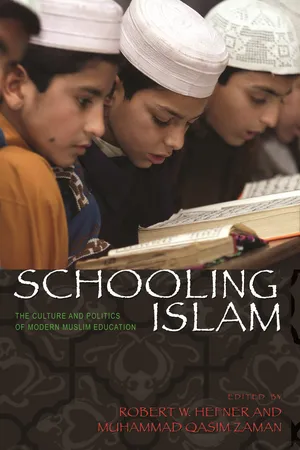
Schooling Islam
The Culture and Politics of Modern Muslim Education
- 296 pages
- English
- PDF
- Available on iOS & Android
Schooling Islam
The Culture and Politics of Modern Muslim Education
About This Book
Since the Taliban seized Kabul in 1996, the public has grappled with the relationship between Islamic education and radical Islam. Media reports tend to paint madrasas--religious schools dedicated to Islamic learning--as medieval institutions opposed to all that is Western and as breeding grounds for terrorists. Others have claimed that without reforms, Islam and the West are doomed to a clash of civilizations.Robert Hefner and Muhammad Qasim Zaman bring together eleven internationally renowned scholars to examine the varieties of modern Muslim education and their implications for national and global politics. The contributors provide new insights into Muslim culture and politics in countries as different as Morocco, Egypt, Pakistan, India, Indonesia, Iran, and Saudi Arabia. They demonstrate that Islamic education is neither timelessly traditional nor medieval, but rather complex, evolving, and diverse in its institutions and practices. They reveal that a struggle for hearts and minds in Muslim lands started long before the Western media discovered madrasas, and that Islamic schools remain on its front line. Schooling Islam is the most comprehensive work available in any language on madrasas and Islamic education.
Frequently asked questions
Information
Table of contents
- Cover
- Contents
- Acknowledgments
- A Note on Transliteration and Spelling
- Contributors
- CHAPTER 1 Introduction: The Culture, Politics, and Future of Muslim Education
- CHAPTER 2 Madrasas Medieval and Modern: Politics, Education, and the Problem of Muslim Identity
- CHAPTER 3 Tradition and Authority in Deobandi Madrasas of South Asia
- CHAPTER 4 Madrasas and Minorities in Secular India
- CHAPTER 5 The “Recentering” of Religious Knowledge and Discourse: The Case of al-Azhar in Twentieth-Century Egypt
- CHAPTER 6 Madrasas in Morocco: Their Vanishing Public Role
- CHAPTER 7 Islam and Education in Secular Turkey: State Policies and the Emergence of the Fethullah Gülen Group
- CHAPTER 8 Pesantren and Madrasa: Muslim Schools and National Ideals in Indonesia
- CHAPTER 9 The Transformation of Muslim Schooling in Mali: The Madrasa as an Institution of Social and Religious Mediation
- CHAPTER 10 Islamic Education in Britain: Approaches to Religious Knowledge in a Pluralistic Society
- CHAPTER 11 Epilogue: Competing Conceptions of Religious Education
- Index